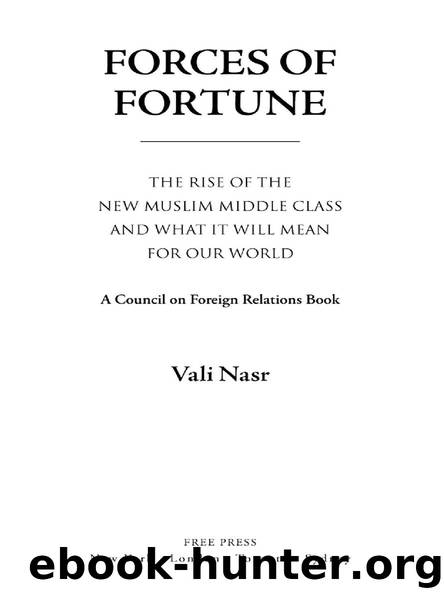Forces Of Fortune by Vali Nasr

Author:Vali Nasr
Language: eng
Format: epub
Publisher: FREE PRESS
Published: 2009-07-15T00:00:00+00:00
At the heart of fundamentalist teaching lies a simple line of reasoning: In the beginning of the faith, religion and politics were one and Muslims rapidly attained power and glory. They can therefore regain that power and glory if religion and politics become one again. Early Islamic history is presented as ideal, from the first generation of Islamic believers in the time of the prophet through the flourishing of the religion under the earliest four caliphs, who ruled between 632 and 661 C.E. 11 In the fundamentalists’ telling, that golden age was a time of simple piety, justice, and above all, spectacular worldly success that vaulted Muslims to the rule of a vast empire. The first four caliphs, Abu Bakr, Umar, Uthman, and Ali, were close companions of the Prophet, who had fought alongside him in battles and heard his counsel in religion and government. Each was chosen caliph by the Muslim community as the most qualified in religion, charged to uphold Islamic law and manage affairs of government, and each was said to enjoy divine legitimacy, which was confirmed by the community’s vote.
The fundamentalist founders argued that the decline of Islam began not, as popular wisdom held, with the decline of the Ottoman Empire, but much earlier, in 661 C.E., when the Umayyad dynasty rose to power and turned the caliphate into a monarchy. Muawiyah who founded the Umayyad caliphate was not a companion of the Prophet or respected for his religious standing. He was a general who strong-armed his way to the top to rule an empire that he then passed on to his son. From that time on, went the argument, clerics had betrayed the faith by submitting to the will of religiously unqualified rulers who in turn sustained them through patronage. They had allowed for religion to be separated from politics, which fundamentalists thought ran counter to the religion’s intent. “The chief characteristic of Islam,” wrote Pakistan’s Mawdudi, “is that it makes no distinction between spiritual and secular life.” 12
Mawdudi was particularly effective in articulating this vision of history and politics. He taught that Islamic history after the seventh century was therefore “un-Islamic” 13 a shocking assertion, rejecting as it did centuries of impressive achievements of Islamic society in the sciences and arts, culture, and the building of powerful empires. Those achievements did not impress him, and he found fault with the manner in which, throughout history, as Islam spread to new regions of the world, it had found expression through local cultures. Such compromises he thought had altered the true meaning of Islam. 14 He also dismissed the moral efforts and spiritual accomplishments of the countless Muslims who had lived by and handed down their faith’s teachings across all those centuries.
Mawdudi did not preach violence; on the contrary he argued that the goal of an Islamic state would be achieved by a steadfast process of proselytizing. To Mawdudi fundamentalism was all about a practice of educating; he would write and give speeches, argue and persuade, and his followers would do the same.
Download
This site does not store any files on its server. We only index and link to content provided by other sites. Please contact the content providers to delete copyright contents if any and email us, we'll remove relevant links or contents immediately.
| Arms Control | Diplomacy |
| Security | Trades & Tariffs |
| Treaties | African |
| Asian | Australian & Oceanian |
| Canadian | Caribbean & Latin American |
| European | Middle Eastern |
| Russian & Former Soviet Union |
The Secret History by Donna Tartt(19010)
The Social Justice Warrior Handbook by Lisa De Pasquale(12179)
Thirteen Reasons Why by Jay Asher(8878)
This Is How You Lose Her by Junot Diaz(6865)
Weapons of Math Destruction by Cathy O'Neil(6253)
Zero to One by Peter Thiel(5776)
Beartown by Fredrik Backman(5722)
The Myth of the Strong Leader by Archie Brown(5485)
The Fire Next Time by James Baldwin(5418)
How Democracies Die by Steven Levitsky & Daniel Ziblatt(5207)
Promise Me, Dad by Joe Biden(5135)
Stone's Rules by Roger Stone(5070)
A Higher Loyalty: Truth, Lies, and Leadership by James Comey(4942)
100 Deadly Skills by Clint Emerson(4904)
Rise and Kill First by Ronen Bergman(4766)
Secrecy World by Jake Bernstein(4733)
The David Icke Guide to the Global Conspiracy (and how to end it) by David Icke(4691)
The Farm by Tom Rob Smith(4494)
The Doomsday Machine by Daniel Ellsberg(4477)
